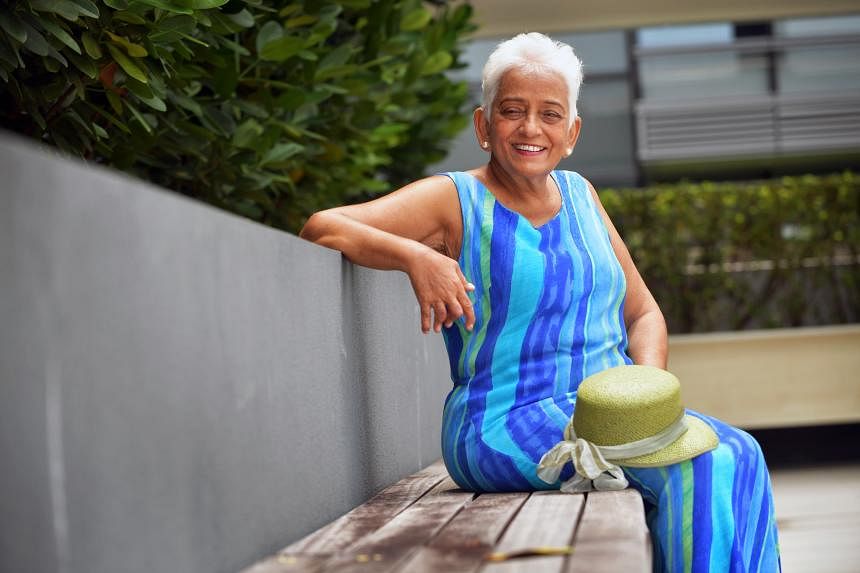
Ms Florence Nathan has a skin condition called psoriasis. Symptoms include pink or red scaly skin and nails too hard to cut. PHOTO: ALPHONSUS CHERN
SINGAPORE – Ms Florence Nathan likes to dress up for photos. She says that when she was younger, she took to heart a magazine article about how to model properly. "I'm a poser," the 70-year-old says with a laugh.
Her positive self-image comes despite living for almost 40 years with a skin condition called psoriasis that can be both painful and embarrassing.
Often mistaken for eczema, psoriasis affects an estimated 40,000 people in Singapore, says consultant Wang Dingyuan from the National Skin Centre.
Eczema or dermatitis is an inflammation of the skin. Mild eczema may manifest as dry, red, itchy skin and, in more severe cases, the skin may ooze clear liquid or pus, or bleed.
Psoriasis, like eczema, is not contagious and manifests as salmon-pink or red lesions and scaly plaques on the skin. Psoriasis patches are more defined than eczema rashes and often appear in areas where the skin folds, such as elbows and knees.
Sufferers may deal with flaking skin, thickened cuticles and hard nails, as well as lesions around the hairline. Psoriasis can lead to arthritis, and the visible symptoms may affect the patient's social life and relationships. It also co-exists with metabolic conditions such as diabetes, high cholesterol and high blood pressure, as well as cardiovascular disease.
People with psoriasis are at risk of developing psychological disorders such as anxiety and depression, says Dr Wang.
Clinical assistant professor Tan Ki Wei, chief and senior consultant at Changi General Hospital's (CGH) department of dermatology, says genetic and environmental factors increase the likelihood of developing psoriasis. CGH sees 500 to 700 patients a year with psoriasis and the number has increased over the years, consistent with global trends, adds Prof Tan.
Psoriasis often occurs in teens and young adults between the ages of 16 and 22, or later in life, at 57 to 60 years old.
Prof Tan says: "Many patients have a family history of psoriasis, while environmental causes include reactions to certain medications, infections and skin trauma. Physical, mental and emotional stress can also trigger or aggravate psoriasis."
There is no cure for psoriasis, he adds, but treatments include using steroid creams, vitamin D analogue creams, phototherapy and oral immune suppressants.
When Ms Nathan was 32, the then corporate secretary discovered red, scaly patches on her body and scalp.
Her hair fell out. The cuticles around her fingernails and toenails became so thick she had to give up manicures and pedicures for years.
Ms Florence Nathan steps into a phototherapy chamber at Changi General Hospital about once a fortnight to manage her condition. ST PHOTO: ALPHONSUS CHERN
At its worst, skin flaked off the exposed parts of her body like dandruff. Her fingers became arthritic and bent. Luckily, her office had switched to electric typewriters so she was still able to do her job.
The support of family and friends, like her late mother and late godmother, ensured she was never embarrassed. "It never bothered me that much because I had a lot of support from friends and relatives," says Ms Nathan, who is single and an avid traveller who enjoys meeting new people.
At one point, she wondered if she should wear stockings to cover the lesions on her legs. Then she decided to embrace her looks and just answer questions about her condition as they came.
She now receives treatment at CGH. Depending on the severity of her skin condition, she enters a phototherapy chamber once or twice a week, or once a fortnight, and is bathed in ultraviolet light for a few minutes.
Ms Nathan speaking with senior staff nurse Isnairah Macud at the Changi General Hospital Medical Centre. ST PHOTO: ALPHONSUS CHERN
This is a common treatment for psoriasis which is also offered at private skin clinics. It can start at $100 a session, with packages available depending on the number of treatments needed. Ms Nathan began phototherapy treatment in the 1990s and now pays a subsidised rate, though she cannot recall the amount.
Prof Tan says that phototherapy reduces the number of overactive immune cells in the skin and slows the rapid growth of skin cells. It is "a useful option for patients with extensive psoriasis who are not keen on oral medications or frequent blood tests", he adds.
Over the years, Ms Nathan has learnt to live confidently with her condition. She hopes her story will inspire others to do the same. "I always tell people with psoriasis not to be self-conscious," she says. "With proper explanation, people stop noticing the lesions or flakiness."













 Get it on Google Play
Get it on Google Play